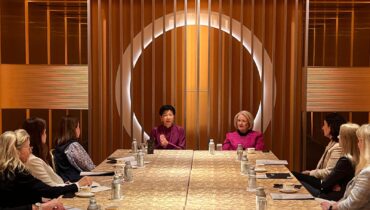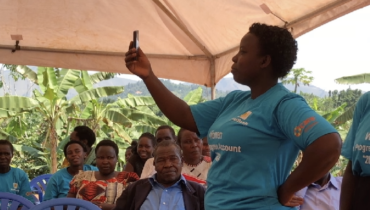Tomorrow in Washington, D.C. President Barack Obama will meet with Saudi monarch King Salman to discuss the security situations in Yemen and Syria, as well as the implications of the Iran Deal. Saudi Arabia has long been a close ally to the United States, and remains a critical and strategic partner in the Gulf region. However, the United States has consistently overlooked Saudi Arabia’s abysmal record on and violation of women’s rights. The United States cannot continue to ignore these violations while simultaneously promoting women’s rights around the world. Saudi Arabia, too, must comply with international human rights law and fully recognize the importance of women’s rights in the face of a volatile economy and unstable region. In the kingdom, women and girls have limited rights that inhibit their engagement in the public sphere, but their participation is essential to Saudi Arabia’s long-term national security, economic security and stability.
When King Salman of Saudi Arabia ascended the throne after the death of his half brother, King Abdullah, in January 2015, the international community asked: what would this new leader bring? Known to be more conservative and closely tied to the religious establishment than King Abdullah, many were concerned that King Salman would slow or even reverse the reforms that King Abdullah implemented.
Although criticized for the glacial pace of progress on women’s rights during his decade-long reign, King Abdullah implemented the most reforms for women that the country had ever seen. He expanded educational opportunities for women, including the creation of the country’s first co-ed university. He increased opportunities for women’s participation in the workforce, including allowing women to serve as store clerks for the first time. He announced that women would be able to run and vote in the 2015 municipal elections. And in 2013, he appointed 30 women to the Shura council, an advisory body to the cabinet. This progress, albeit slow, for Saudi women under King Abdullah was “perhaps [his] greatest achievement.”
Now, eight months under King Salman’s leadership, little has changed for women. While Salman has not reversed any of the reforms that women gained before his reign, he has also resisted building upon the momentum that King Abdullah created.
Yet, with Saudi women entering the political arena and oil prices down, the changing political and economic landscape of Saudi Arabia offers King Salman an opportunity to capitalize on the momentum created by his predecessor. As Saudi Arabia’s oil reserves are not endless, the kingdom would be wise to start planning ways to diversify their economy, and can do so by encouraging greater workforce participation, especially among women. In this dynamic social, political and economic climate, questions still remain as to how women in Saudi Arabia will fare under King Salman.
On August 20, 2015, the first Saudi women in the history of the Kingdom registered to vote. Additionally, an estimated 70 women are planning to register as candidates in the December municipal elections, and 80 women are serving as campaign managers, according to local media. While many are quick to label this moment a watershed, critics argue that giving women the right to vote and run for office only presents women with limited power within the existing political establishments, where discrimination against women remains institutionalized. In fact, to date only 16 Saudi women have registered to vote for the December elections.
While women’s political participation at the municipal level alone may not be able to completely alter political structures, studies show that increased female political representation positively affects women’s economic opportunities, and can increase overall female labor force participation. Granting Saudi women an increased role in the country’s political structures highlights the increasing importance of women playing a larger role in both society and the economy.
Further, a variety of economic factors – including low oil prices, rising cost of living and a rapidly growing population – have made it necessary for women in Saudi Arabia to enter the workforce, and they are doing so in record numbers. Due to the rapidly changing economic situation, Saudi families now need two incomes if they want to maintain their lifestyles. According to Saudi Arabia’s Central Department of Statistics and Information, employment of Saudi women has increased by 48 percent in the last five years, more than double the rate for Saudi men.
Despite the need for increased female labor participation in the kingdom, it remains extremely difficult for women to work in a country where laws and customs prevent them from doing so. Women now make up 49.6 percent of Saudi university graduates, yet they make up only 16 percent of Saudis with jobs, and are limited in the work they are allowed to do. The country’s guardianship system prevents women from doing many everyday tasks without the permission or accompaniment of a male guardian, and women are not allowed to occupy the same spaces as men who are not relatives.
In order for the country’s economy to continue to thrive and become less dependent on oil revenues, Saudi Arabia must fully incorporate women into the formal economy, rather than make it difficult for them to participate. In order for women to be included in the formal workforce, they need the rights that would allow them to do so. For example, under King Abdullah’s rule, women were first permitted to stay at hotels without a letter from their male guardian because businesswomen needed to be able to travel for business purposes. However, women in Saudi Arabia are still forbidden from driving, which is a hindrance to their economic participation, particularly for women from poorer families, who cannot afford drivers to get them to and from work. As jobs begin to open for women, laws and institutions must change to allow women to participate in the formal economy. As Stephen Marche wrote for The Atlantic, “Gender attitudes do not affect economic reality, but rather the other way around.”
While these restrictions are in place, companies open to female employees are forced to find creative solutions. For example, in order to provide jobs to Saudi women without clashing with widely held conservative values that do not allow for men and women to “mix” in public, three companies have created female-only workplaces. General Electric, Saudi Aramco, and Tata Consulting Services opened a female-only business-processing center that aims to employ as many as 3,000 women.
In addition to the emergence of this parallel workforce, informal economies are arising out of economic need and potential, circumventing the formal and gender-restrictive Saudi economy, and demonstrating the resilience and savvy of Saudi women. Instagram, like other social media sites, acts as an marketplace where women can sell their goods without having to use the traditional methods – enlisting a male sponsor to represent them before government agencies and signing official documents on their behalf. As a Saudi woman who runs a successful business on Instagram stated: “I can solve any problems or difficulties, financial or otherwise, without the interference of family members.” Although this informal economic participation presents empowering opportunities for women, it remains unmeasured by the nation’s GDP, therefore hindering Saudi Arabia’s potential for growth and diversification of the economy.
Despite these successes for women in the economy, restrictions on women working must be removed and access to employment made easier if the country seeks to thrive economically. As Bill Gates said of Saudi Arabia at the 2007 World Economic Forum meeting, “If you’re not fully utilizing half the talent in the country, you’re not going to get too close to the top.”
With its inability to remain a strictly oil-driven economy, Saudi Arabia needs to look to the future and change the laws that stymie women’s economic participation. Women gaining the right to vote and participating in the upcoming elections are important steps forward, but should not be overestimated. King Salman and the Saudi leadership need to embrace women’s political, social and economic potential, making clear that if they don’t, their economy will suffer.
With contributions from Alexandra Z. Safir and Erica Vásquez.


